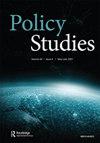气候变化的中介作用:被忽视的“气候中介”的演变策略、相互作用和影响
IF 2.3
4区 管理学
Q2 PUBLIC ADMINISTRATION
引用次数: 7
摘要
气候变化治理体系包括各种各样的行动者。在这里,我们将“气候中介机构”作为一种具有潜在影响力但经常被忽视的行为者类型引入,充当连接不同类型行为者和/或治理级别的“中间人”。本期特刊分析了两种尚未得到充分研究的气候中介形式:由于与气候变化无关的原因而存在的气候中介形式,以及尚未得到研究的新的或不常见的气候中介形式。在这篇导论文章中,我们提出了我们特刊中采用的概念框架。在澄清我们自己对“气候中介”的关系理解之前,我们首先对气候研究中中介的定义提出质疑。因此,气候中介是一种角色,由任何类型的行动者承担,同时在与其他行动者互动时可能承担其他角色。其次,我们总结了关于中介策略、中介之间可能存在的相互作用以及中介行为体对气候政策过程影响的现有研究。然后,这三个焦点指导我们的三个研究问题的特刊。第三,我们考察了现有的关于各种中介机构的研究,如利益集团、基于信仰的行动者和资助机构。最后,我们概述了该问题中包含的贡献。本文章由计算机程序翻译,如有差异,请以英文原文为准。
Intermediating climate change: the evolving strategies, interactions and impacts of neglected “climate intermediaries”
ABSTRACT
Climate change governance systems comprise a wide variety of actors. Here, we introduce “climate intermediaries” as one potentially influential yet often neglected type of actor, behaving as “go-betweens” that connect different types of actors and/or governance levels. This Special Issue analyses two under-researched forms of climate intermediaries: those that exist for reasons unconnected to climate change, and new or uncommon forms of climate intermediaries that have yet to be examined. In this Introduction article, we present the conceptual framework employed within our Special Issue. We begin by problematizing the definition of intermediaries within climate research before clarifying our own relational understanding of “climate intermediaries”. A climate intermediary is thus a role, assumed by any type of actor, while potentially assuming other roles when interacting with other actors. Second, we summarize the existing research on the strategies of intermediaries, the interactions that may exist between them, and the impacts of these actors on the climate policy process. These three foci then guide our three research questions for the Special Issue. Third, we examine existing research on myriad types of intermediaries, such as interest groups, faith-based actors, and funding bodies. Finally, we provide an overview of the contributions included within the issue.
求助全文
通过发布文献求助,成功后即可免费获取论文全文。
去求助
来源期刊

Policy Studies
PUBLIC ADMINISTRATION-
CiteScore
5.40
自引率
4.50%
发文量
34
期刊介绍:
These changes at the structural level of the global system have impacted upon the work of public organizations either directly or indirectly and have broadened the field of action in policy studies. It has five main areas of intellectual interest: 1.To broaden the lens of policy analysis through the publication of research which locates policy-making within a theoretical, historical or comparative perspective. 2.To widen the field of enquiry in policy analysis through the publication of research that examines policy issues in a British, comparative, international or global context. 3.To promote constructive debate on theoretical, methodological and empirical issues in policy analysis.
 求助内容:
求助内容: 应助结果提醒方式:
应助结果提醒方式:


